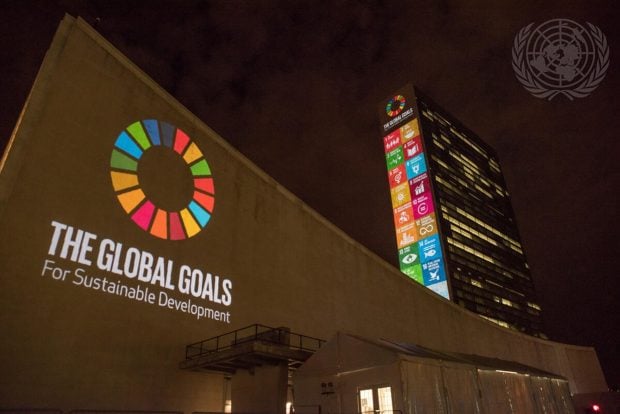UN recognises public service projects that are advancing SDGs, US procurement officials get data ‘co-pilot’: news in brief

Global Government Forum’s weekly news roundup of public service intelligence
In this edition:
- UN awards recognise public service projects that are accelerating SDGs
- US federal procurement officials get more data to make better decisions
- New Zealand minister says government hasn’t cut enough civil service jobs
- US General Services Administration launches first cohort of AI innovation fellows
- This week on Global Government Forum
UN awards recognise public service projects that are accelerating SDGs

Fifteen initiatives from countries including Brazil, Germany, Indonesia and South Korea have been recognised in the latest UN Public Service Awards.
The projects were picked from 400 applications from 73 countries. They include a programme to train female victims of violence in construction work in Brazil; a vulnerability index to assess climate risks in Indonesia; and a policy to prevent digital sex crimes in South Korea.
The UN Public Service Awards recognise excellence in public service delivery and reward the creative achievements and contributions of public administrations worldwide. Since the first edition in 2003, over 300 initiatives have been awarded.
A statement from the United Nations Department of Economic and Social Affairs said: “All of this year’s awardees have implemented new solutions to provide services to people, while advancing the Sustainable Development Goals (SDGs). Winning initiatives also leveraged ICT and digital government to respond to multiple global challenges and enhance the capabilities of public administrations across the world.”
Five winners in the innovation in public institutions category were Sao Paulo City Hall, Brazil for its Intermediation Center for Sign Language; Germany’s Ministry for Economic Affairs and Climate Action for its BQ Portal for Foreign Professional Qualifications; Latvia’s State Chancellery for its Unified Portal for Draft Legal Acts; the Western Cape Government of South Africa for its Citizen-centric Digital Transformation programme; and Thailand’s Chulalongkorn University for its Academic Insight for Pandemic Response.
Projects by Colombia’s High District Counseling Office, the Provincial Government of Manabi in Ecuador and the e-Government Authority of Tanzania received honourable mentions.
The winner in the gender equality category was Seoul Metropolitan Government for its Digital Sex Crime Comprehensive Response Policy. Salvador City Hall in Brazil, Indonesia’s Semarang City Government and the Portuguese Ministry of National Defence received honourable mentions.
In the climate action category, the winners were Indonesia’s Ministry of Environment and Forestry for its Vulnerability Index Data Information System; Jordan’s Greater Amman Municipality for the Improving Living Conditions in Amman programme; and Portugal’s Lousa Municipality for its SEE H2O initiative.
Read Global Government Forum’s latest Sustainability Monitor: The missing link in national climate plans – cities, green pledges in UK election manifestos, and more
US federal procurement officials get more data to make better decisions

The White House has launched what it calls a “procurement co-pilot” system that brings together data from across the US federal government to optimise purchasing power.
The procurement co-pilot system brings together government-wide price data to give buyers better information about the prices that government has paid for products, and how it varies across vendors and contract types, as well as the best time to buy an item based on historical trends.
The system leverages government-wide data from the Federal Procurement Data Systems and procurement portal SAM.gov, along with prices paid data from best in class contract vehicles. Agency-specific pricing data will be included in future iterations.
In an interview with Nextgov/FCW, Christine Harada, senior advisor for the Office of Federal Procurement Policy, who is currently performing the duties of the OFPP administrator, said the tool is the outcome of multi-year efforts to connect contracting officials with data, and is powered by data coming from all across the government. The tool is based on products, not services, although the government plans to expand the scope over time.
Harada said that the tool will help share information on the prices paid for products, as procurement officers are looking for this information.
“This is just the beginning,” she told Netxgov/FCW. “We want to make sure that we are leveraging [government data] to the best of our abilities, as much as possible, not just from a workflow and efficiency perspective, but ensuring that we are getting the best bang for our buck, if you will, and providing the best taxpayer dollar stewardship.”
Read Global Government Forum’s latest Digital and Data Monitor: UK election manifesto tech takeaways, a personal reflection on transforming digital services, and more
New Zealand minister says government hasn’t cut enough civil service jobs

A minister in the New Zealand government has said that not enough has been done to cut the size of the public service.
David Seymour, who is the leader of the ACT Party and minister for regulation in the National Party-led coalition, said he was “never comfortable with any level of government spending that could be reduced”.
A tally by Radio New Zealand (RNZ) estimates that more than 6,000 jobs have already gone, or are set to go, but Seymour, who campaigned on downsizing the public service by 15,000 staff – a return to the 2017 headcount – said he would like to go further.
“New Zealand had a stable size of the public service in the years 2012 to 2016,” he said.
“There’s been some population growth since that period, but by and large we saw a New Zealand government that could function and deliver the services people needed.”
Read Global Government Forum’s Management and Workforce Monitor: UK government to launch attraction strategy for recruitment, a reform idea from Romania, and more
US General Services Administration hosts first cohort of AI innovation fellows

The US General Services Administration launched the second cohort of its Presidential Innovation Fellows (PIF) on 17 June, marking the first class of the programme that is exclusively focused on artificial intelligence.
The PIF programme is a “federal talent pipeline to recruit top AI talent into government”, according to the Biden administration’s executive order on the safe, secure, and trustworthy development and use of artificial intelligence signed last year.
The AI cohort is made up of 11 experts from top tech firms, start-ups, and organisations across the country. GSA said it is expected to begin a “tour of duty” in the US civil service. It is set to last a year and will operate out of eight federal agencies.
GSA meanwhile said that more than 2,500 people answered the call for applications.
Projects will include maximising the potential of AI to “increase access to justice” for citizens, while minimising the risk of consumer harm, and “harnessing data and AI to enhance the electric grid infrastructure to enable the provision of clean, affordable, reliable, resilient, and secure electric power to all Americans”, GSA said.
Helena Fu, director of the Department of Energy’s Office of Critical and Emerging Technologies, said the programme would “advance [the agency’s] transformative work at the intersection of AI and energy”.
Fu added that the fellowship would advance the department’s VoltAIc Initiative, which she said was working to build “AI-powered tools to streamline siting and permitting to help accelerate deployment of clean energy infrastructure”.
Dominic Mancini, deputy administrator of the Office of Information and Regulatory Affairs in the US Office of Management and Budget, said that the collaboration between the fellows and the agencies would serve to exemplify “the society-wide effort that responsible use of AI demands”.
The GSA’s Technology Transformation Services, meanwhile, is on track to hire over 100 technologists in 2024, including over 200 fellows of which 120 technologists are in AI and AI-enabling roles.
The new fellows and their agencies are:
- Maria Botchkova, U.S. Department of Justice
- John Cronin, Department of Defense
- Brian Karfunkel, U.S. Department of Justice
- Nandini Nayak, Ph.D., Federal Housing Finance Agency
- Anjali Patel, Equal Employment Opportunity Commission
- James Pavur, Ph.D., U.S. Department of State
- Pranava Raparla, Department of Energy
- Scott Riffle, Department of Defense
- Arushi Saxena, Office of Management and Budget
- Matthew R. Versaggi, MS, MBA, Center for Medicare & Medicaid Services
- Rebecca N. White, U.S. Department of Justice
Read Global Government Forum’s latest AI Monitor: Professor Sue Black on AI and education, innovation challenge winner tackles major AI barriers, and more





















